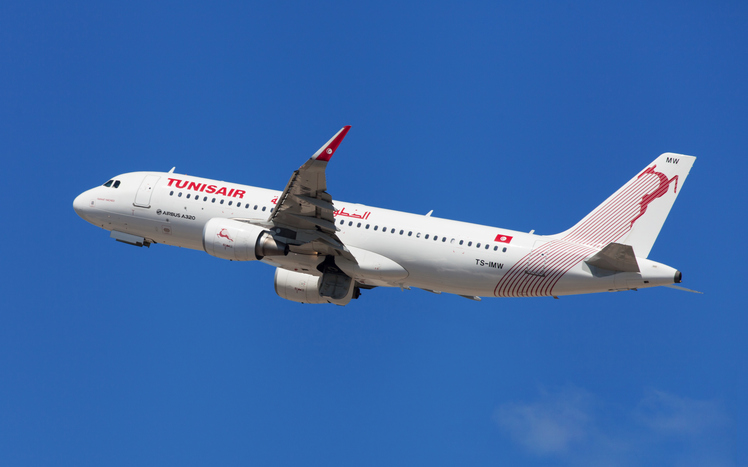Tunisair is counting on new African routes to drive passenger growth as it prepares for increased competition for flights to and from Europe under an “Open Skies” agreement with the EU.
The Tunisian state-owned airline will launch two new routes by the end of this year, to Sudan and Cameroon, the company told Reuters. That will bring the number of its African routes to 10, after it began flights to Guinea and Benin last year.
New paths to growth could be vital for the survival of loss-making Tunisair, the national flag carrier and one of the North African country’s biggest employers.
Whether its business can adapt to the Open Skies agreement is also a test case of whether the Tunisian economy and its slew of state firms can modernise and compete after being shielded from foreign rivals for decades. The deal, which comes into force later this year, will put European carriers on a level footing with Tunisair in terms of airport slots and fees.
“The agreement will have a good impact on the tourism sector and boost activities at Tunisian airports,” said Mohammed Ali al-Toumi, head of the Tunisian federation of travel agencies. “But Tunisair is not ready for fierce competition.”
Flights to and from Europe are Tunisair’s main business; they accounted for 68.9 per cent of its 475,000 passengers in the first two months of 2018, compared with African routes’ 16.9 percent and the Middle East’s 13.4 percent.
However the African passenger numbers are growing far faster – they increased by 27 percent in that period year-on-year, compared with a 4.6 percent rise in European route passengers.
A pivot towards Africa will not be easy.
Tunisair is not the only carrier looking to capitalise on strong growth in African air passenger numbers, which the International Air Transport Association sees growing by almost 6 percent a year over the next decade due to increasing economic output and poor road and rail links. That compares with 2.3 percent for both the European and North American markets.
Tunisair’s regional rival Royal Air Maroc of Morocco, Gulf carriers like Emirates and Turkish Airlines, for example, are also expanding on the continent.
They have deeper pockets and are more advanced; Turkish Airlines already flies to over 30 African countries and is planning to add new destinations including Luanda and Juba.
Strike Threat
Even should Africa continue to deliver rapid passenger growth for Tunisair, in which Air France-KLM holds about 5 percent, the carrier faces deep problems.
It has been posting losses for years, hit hard by a tourism slump after militant attacks and the loss of major market Libya – which made up 25 percent of its business – when it stopped flying there in 2014 for security reasons.
It also has a big workforce; the carrier, which has a fleet of 32 aircraft, employs 8,000 staff. By comparison Royal Air Maroc, with more than 50 aircraft, has 3,300 workers.
Some company insiders said a change of culture was needed for a workforce that is unused to competition and enjoys generous benefits like heavily discounted tickets for relatives.
The government aims to cut 1,200 Tunisair jobs by voluntary redundancies, and wants to reduce costs further, but any attempt to lay off workers or cut benefits are opposed by powerful unions.
Tunisair declined to comment about the Open Skies deal, staff size or union opposition, referring queries to the transport ministry.
The Transport Minister Radhouan Ayara told Reuters a planned revamp of the carrier would boost its competitiveness, though did not provide further details. As a result, he said he expected Tunisair passenger numbers to rise to 4 million next year, up from 3.5 million in 2017.
However Elyes Ben Miled, general secretary of the Tunisair union, which represents thousands of workers, told Reuters his organisation was prepared to strike if the government did not pump more money into the carrier ahead of liberalisation.
“The agreement is a catastrophe. Tunisair is not ready yet for competition,” said Miled, who works out of the Tunisair headquarters. “We are ready for everything and we may go on national strike at all Tunisian airports.”
He said the carrier could collapse within seven months if Ryanair started offering tickets for 80 euros to Europe like it did from Morocco. By comparison Tunisair charges 220-400 euros.
The ministry denied Tunisair was in any danger of collapse.
Walking Tightrope
Prime Minister Youssef Chahed is walking a tightrope, sitting on a weak coalition of secular and Islamist forces who have often clashed over the country’s direction since the toppling of autocrat Zine El-Abidine Ben Ali in 2011.
The government agreed to the air traffic liberalisation deal under pressure from international donors who want the government to modernise the economy, beef up the private sector and revamp inefficient state firms.
Officials, hotels and travel agencies hope low-cost carriers will put Tunisia on their map, bringing in more tourists like in Morocco where the number of travellers has doubled since the kingdom agreed on a similar deal in 2005.
Company and government officials want Tunisair to focus on the African routes to establish Tunis as transit hub like Casablanca for Royal Air Maroc. As part of the drive, the carrier plans to buy five aircraft A320s by 2022.
With Tunisia’s foreign reserves having fallen to less than 80 days worth of imports there are hardly funds available to compete on size with Royal Air Maroc, which has just ordered four Dreamliner jets from Boeing.







